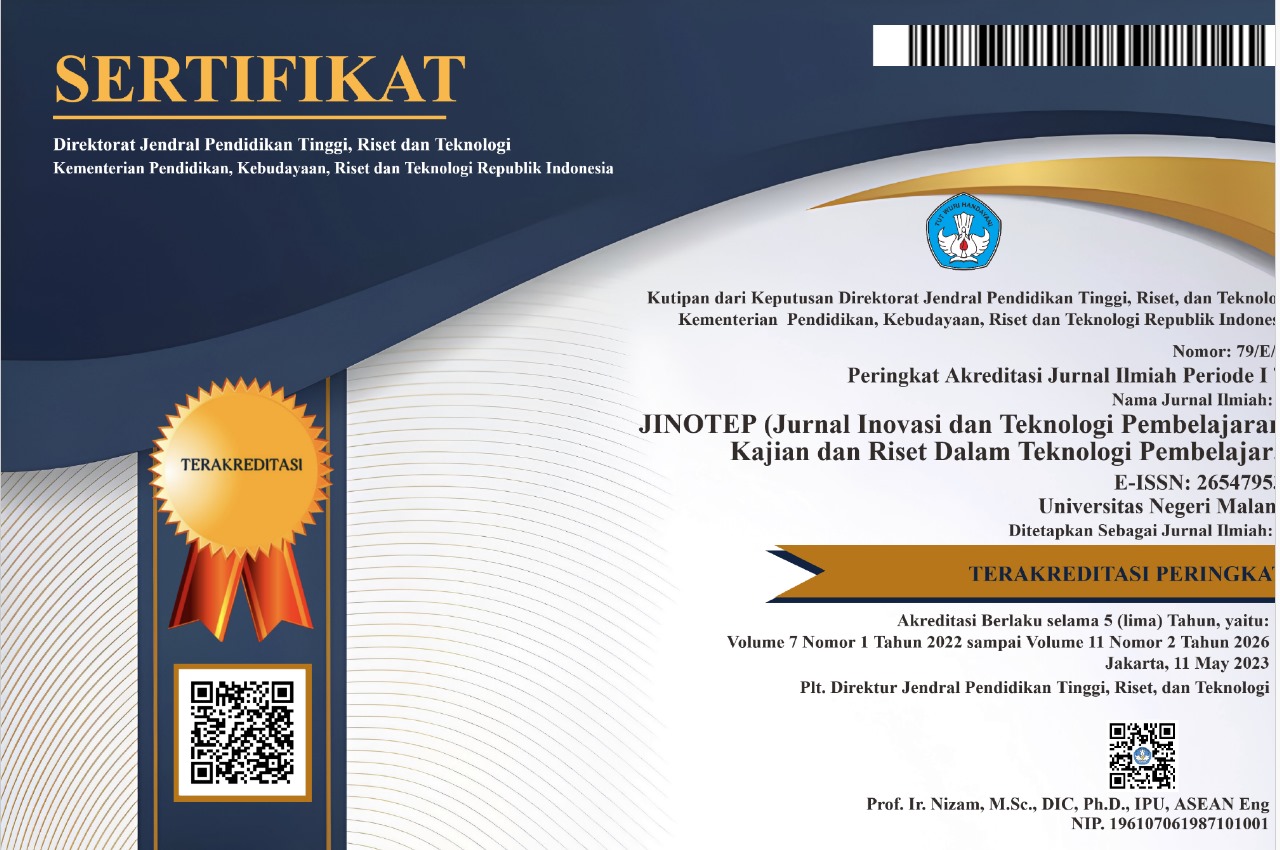Personalized Learning dan Multimedia Berbasis Komputer Masih Perlukah Guru?
Abstract
Abstrak: Sejak berkembangnya teknologi infomasi dan komunikasi, banyak klaim dari para teknolog pembelajaran bahwa peran guru akan semakin berkurang dan bahkan berakhir, namun klaim- klaim tersebut sampai saat ini tidak terbukti meskipun teknologi multimedia semakin canggih. Di samping itu model-model pembelajaran juga memberikan dukungan terhadap bentuk-bentuk pembelajaran yang semakin individual, salah satunya adalah personilezed learning yang memberi kesempatan setiap siswa untuk maju dan berkembang menurut kecepatan dan kemampuan masing–masing siswa dalam penguasaan materi dan belajar sesuai dengan keinginan dan kemampuannya masing-masing. Dengan demikian, gabungan antara kecanggihan teknologi multimedia interaktif dan meodel pembelajaran individu semakin menguatkan asumsi bahwa peran guru akan berakhir, oleh karenanya tulisan ini ingin mengakaji secara teoritik apakah kekhawatiran tersebut memang relevan secara teoritik praktik.
Abstract: Since the development of information and communication technology, there have been many claims from learning technologists that the role of teachers will diminish and even end, but the claims to date have not been proven even though multimedia technology is increasingly sophisticated. In addition, learning models also provide support for increasingly individual forms of learning, one of which is personalized learning which gives each student the opportunity to progress and develop according to the speed and ability of each student in mastering the material and learning according to their wishes and their respective abilities. Thus, the combination of the sophistication of interactive multimedia technology and the model of individual learning further strengthens the assumption that the teacher's role will end, so this paper wants to theoretically assess whether these concerns are indeed theoretically relevant practices.
Keywords
Full Text:
PDFReferences
Arsyad, Azhar (2010) Media Pembelajaran. Jakarta. Rajawali Pers.
Degeng, N. S. (2013) Ilmu Pembelajaran Klasifikasi Variabel untuk Pengembangan Teori dan Penelitian. Bandung: Kalam Hidup.
DePorter, B. (2002) Quantum Teaching: Memraktikkan Quantum Learning di Ruang Ruang Kelas. Terjemahan oleh Ary Nilandari. Bandung: Kaifa.
Etes, C.A. (2004) Promoting Student Centered Learning in Experiental Education. Journal of Experiental Education. 27 (2). 141-160
Hergenhahn, B.R. & Olson, Mattew, H.(2008)Theories of Learning. Edisi Ketujuh. Terjemahan oleh Tri Wibowo B.S. 2010.Jakarta: Kencana Prenada Media Group.
Keller, F.S. (1968) Good-bye Teacher. Journal of Applied Behavior Analysis. 1, 79-89
Mayer, R. E. (2001) Multimedia learning.Cambridge: Cambridge University Press.
Mayer, R. E., & Moreno, R. (2007). A Cognitive Theory of Multimedia Learning: Implications for Design Principles. (online).
Merril P., Hammons K., Vincetn B., Reynolds P., Christensen L., Tolman M. (1996) Computers in Educational. Third Edition. New Jersey: Merrill Prentice Hall.
Miarso, Yusufhadi. (2004) Menyemai Benih Teknologi Pendidikan. Jakarta: Prenada Media.
Reigeluth, Charles M (1983) Intructional Design Theories and Models. Laurence Erlbaum Associates: New Jersey.
Sahabuddin, N.A. & Ali, M.B. (2013) Personalized learning and style among upper secondary school students.Procedia-Social and Behavioral Sciences 103. 710-716
Tamir, P. (1986) Current and Potential Uses of Microcomputers in Science Education. Journal of Compters in Mathematics and Science Teachng. Winter 1986.
Wilbur, Schramm (1984)Media Besar dan Medi Kecil; Alat dan Teknologi untuk Pendidikan, alih bahasa oleh Agafur, M.Sc. IKIP Semarang Press.
DOI: http://dx.doi.org/10.17977/um031v1i12014p050
Refbacks
- There are currently no refbacks.
Copyright (c) 2014 Mufdalifah

This work is licensed under a Creative Commons Attribution-ShareAlike 4.0 International License.
======================================================================
Jurnal Inovasi dan Teknologi Pembelajaran published by Universitas Negeri Malang in collaboration with the Asosiasi Program Studi Teknologi Pendidikan Indonesia (APS TPI) and Ikatan Profesi Teknologi Pendidikan Indonesia (IPTPI) with a MoU.
Publisher Address:
Educational Technology Laboratorium, Building D5, 1st Floor
Faculty of Education, Universitas Negeri Malang
Semarang St. No. 5, Malang City, East Java Province, Postal Code 65145
Email: jinotep.fip@um.ac.id
======================================================================

JINOTEP is licensed under a Creative Commons Attribution-ShareAlike 4.0 International License.
JINOTEP Statistics (Since July 13th, 2020)


.png)




.png)
1.png)
1.png)
4.png)
2.png)
1.png)
1.png)
.png)


_3.png)





1.png)
.png)